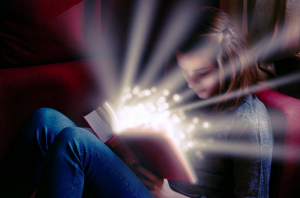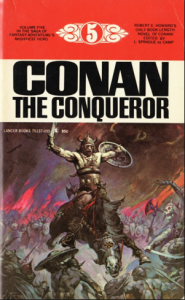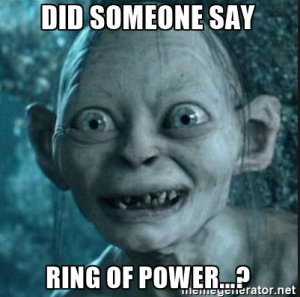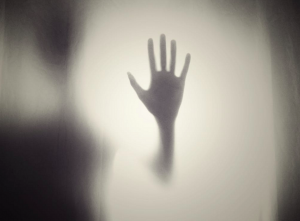
Monday we brushed the surface of speculative fiction and why it can be such a powerful and world-changing genre when executed well. In my opinion (based on years of experience with new manuscripts) this genre shares a lot of the same pitfalls as literary/character-driven novels. If we aren’t careful, world-building—while vital—can take over and obscure the human story.
While literary authors don’t face the perils of too many dragons or spaceships, they can run into a similar world-building dilemma with prose and too much inner demon navel-gazing self-exploration. The world-building is “internal” and vital, but the key is to make sure this “inner world” is serving the story not smothering the life out of it.
Though what we are talking about today can be useful for virtually any genre, it plays a special importance in genres that come part and parcel with elements that can easily become distractions.
Lasers, spaceships, magic, demons, technology, kingdom rivalries, portals are necessary for spec fic and fantasy. Yet we are wise to appreciate that these elements, while potentially beautiful, can easily get of control.
Like the wisteria I planted that tried to eat my house.
Just like a mystery must come with a crime and a romance requires an HEA, spec fic and fantasy also possess ingredients fundamental to the very definition of the work. It would be weird to have a science fiction with no “science” or a fantasy with nothing “fantastical.” Our job as the author it to make sure everything harmonizes.
Yes, while we need superlative world-building, WB alone does not a story make. Readers don’t want to hang out on our personal holodeck (or in our Literary Barbie Dream House). They long to be invited along on an adventure, and to become part of that adventure.
Empathy is the mechanism (plug) that connects the readers’ consciousness into our characters (socket) where they experience the raw energy of the stories we tell. Insert plug into couch cushions, small houseplants or mini-blinds and nothing happens aside from looking like an idiot. A socket with no plug serves no purpose and vice versa.
Connect them together?

This is where characterization becomes a game-changer.
When reading Stephen King’s Danse Macabre, there were a couple of assertions King made that really opened my eyes as to what made the difference between the fun escapist fiction versus the books we read for generations.
Power vs. Resonance

All spec fic and fantasy are about power. Monday we mentioned there are different types of fiction to serve different needs. Some fiction is just mind candy, a place to escape and get away and get some mental R&R away from “adulting” and that is a good thing. We need books like that and readers enjoy them.
Robert E. Howard’s Conan the Barbarian books are a prime example. These are standard sword and sorcery tales and Howard wrote more than fifty of these himself. Other authors added to the trove of stories about Conan.
Yet Conan was a character who always had power, never lost it and only wielded it. In King’s words, these were “tales of power for the powerless” which explains why I loved books like these so much as a geeky teen (definition of “powerless”).
According to King (and I concur), the great fantasy fiction (and spec fic) revolves around those who find power at great cost or who have power and lose it tragically. This is the crossroad where tales of Conan and the legends of King Arthur part ways.

When we look at Lord of the Rings the Hobbits are given what they always longed for. They wanted adventure and they learned that the smallest of all can make the largest of difference. This quest reveals strengths and abilities they were unaware they possessed. They come to learn they can fight in battle, brave trolls and orcs and giant spiders and ride horseback while battling vast armies.
They learn they are smarter, braver, tougher and stronger than they dreamed possible. That of all the races, they alone could resist the temptation of Sauron’s Ring of Power, rendering them the only ones capable of destroying it and thus saving Middle Earth.
Yet there is a heavy price.
Innocence.
Yes, they save the Shire, but can never return to it. Not really.
We witness this in one of the final scenes of Return of the King. We see our band of Hobbits in the same pub and while the other Hobbits they saved are drinking and dancing and laughing, our party sits quiet, somber, broken and grieving far too much death and loss.
They’re sharing more than a round of pints. They share a dark suffering reflected back in each others eyes and wounds that never will fully heal. They will never be the same.
Great power has been granted…but at tremendous cost.
Same thing in horror. In Stephen King’s It the children (even as adults) refer to themselves as “The Losers Club” because they are the outcasts of Derry: the fat kid, the boy with the stutter, the geeky class clown, the “white trash” tomboy girl, the Jew, the black kid, and the mama’s boy hypochondriac. The least likely to destroy a creature as old as time are the ones who discover they’re the only ones who can defeat it.

But, again this power comes with tremendous sacrifice and at great cost. They didn’t ask to be heroes but rose to the call knowing what it would mean.
Did We Mention the Supers?
Spec fic also covers super heroes, super villains, etc. The comic world is all spec fic. Yet, if we look at all the great superhero comics and movies, we see a similar pattern. How many superheroes/super-villains have been created over the past several decades, yet of that number, how many endured? Or have been elevated to modern legends?
Arm Fall-Off Boy, Color Kid, Skateman, Vibe, and no I am not kidding Squirrel Girl all made it into the comic world only to exit just as readily. All of these superheroes failed for a number of reasons beyond being stupid ideas to begin with.
The creators became too fixated on a “different superpower” and so I guess that is how one comes up with a Vietnam veteran who fights crime on roller skates or an even more lame@$$ superpower of being able to…change the color of things.
*scratches head*
Super powers were not enough to make these characters into super heroes and thus they were quickly (and eagerly) forgotten.

As I hear it Arm Fall-Off Boy is serving time in Pensacola for disability fraud, Vibe was sued for sexual harassment, and Squirrel Girl lives in NYC near Central Park with her life partner Color Kid who found his true calling…interior design. Skateman was unavailable for comment.
All kidding aside, super powers alone were never enough to elevate these “characters” into the staple heroes/anti-heroes/villains we know and love even today. There had to be resonance and resonance comes from what King described…those who find power at great cost or who have power and lose it tragically.
Resonance is why we remember Batman, Spiderman, Mr. Freeze, Harley, Wonder Woman, Two Face, Joker, and Captain America and why they’ve been reinvented time and time again.
Resonance is why audiences cheer for anti-heroes like Deadpool, The Punisher and Spawn. Resonance is the difference between the mundane and the memorable and resonance comes only with creating dimensional characters with human flaws and emotions.
What are your thoughts? I always had a fondness for villains with tragic backstory. Mr. Freeze? *clutches chest* What resonates with you? What characters and stories connected to you? What stories, movies, television shows fell flat and why? I am no comic expert, but which ones were your favorites and why?
I love hearing from you! And I am not above bribery to hear your thoughts 😀 .
For the month of JULY, for everyone who leaves a comment, I will put your name in a hat. If you comment and link back to my blog on your blog, you get your name in the hat twice. What do you win? The unvarnished truth from yours truly.
I will pick a winner once a month and it will be a critique of the first 20 pages of your novel, or your query letter, or your synopsis (5 pages or less).
****And MAKE SURE to check out the classes below and sign up! Summer school! YAY! We’ve added in classes on erotica/high heat romance, fantasy, how to write strong female characters and MORE! Classes with me, with USA Today Best-Selling Author Cait Reynolds and award-winning author and journalist Lisa-Hall Wilson. So click on a tile and sign up!
[abcf-grid-gallery-custom-links id=”22231″]








15 comments
2 pings
Skip to comment form
A great way of looking at things Kristen.
Going back now to examine the “resonance factor” in my MC.
I know this — I do, honest! But…you always put things in a deeper perspective, and then I have to dive into the box marked ‘1967’ to re-connect with my long-ago favs.
Great post, as always — a must-read for some of my earnest clients who seem to use spin-a-power wheels for their characters.
Loved this post! I can see how the power thing translates to fantasy, but not quite sure about science fiction. Very insightful at any rate. Thanks!
Author
Take Minority Report. Initially Anderton has the power to stop murder before it happens (Pre-Crime). He has to give it up for the greater good and because it is the right thing to do…but it comes at a high price. His guilt of having haloed (imprisoned) how many potentially innocent people who might have done as he did and not acted out at the last second. He loses his job, his mentor, his identity and his crusade to stop crime before anyone is made into a victim. A tool that might have prevented the abduction and murder of his young son.
Always entertaining and makes me think. Thank you.
Superheroes are just a subset of deus ex. Batman is at least human. His superpowers are won by the sweat of his extremely rich brow…or the brows of his underlings who make those nifty…things. Iron Man? Very similar. Superman’s creators came up with “Kryptonite,” in an lame attempt to fix his deus ex qualities, make him more like a person–fallible, vulnerable, worthy of empathy. Superheroes as a class, with a few exceptions, will always suck like fruit bats on mangos.
Mind blown. Wow, Kristen. You have the abundant gift of clarifying the thoughts I am not fully able to express, or grasp. I know what you mean, but couldn’t have said it. Your hobbit example is wonderful. Nailed it. Thanks so much!
This was thought-provoking and helpful. When I struggle with plot, or “where to go next” in my own WIP, I find articles like this help me to step back and see it from a whole. What rules can I emphasize? What rules can I break?
I was always a fan of Ra’s Al Guhl. Committed to the rescue of the planet because others wouldn’t. His methods….yeah. It’s why he’s a villain.
Interesting thought process, though, on what makes characters resonate. Seems to me to be why we loved Wonder Woman and I wanted my 2 hours back after Batman vs Superman.
I find the contrast between these characters having power or gaining it with the empathy we want the readers to have for these characters interesting. Also when you talked about modern super heros it makes me think of many ‘superlike’ heroes throughout literary history, how they often had ‘hubris’ or some kind of fatal flaw or background.
Iron man for instance, loves the spot light and being the hero that he almost loses Pepper due to his pride. Bateman in the Christian Slater ones, as much as he is a hero is the enemy, must b/co it for a Gotham to survive.
Way back when Beuowulf is a grand hero but he is subject to the infallibility of his character and that in the end fighting the dragon, there is only death for heros such as him. His immortality is through the stories left behind about his heroic deeds.
Again, interesting piece 🙂
https://mandibelle16.wordpress.com/2017/07/29/flash-fiction-for-the-aspiring-writer-open-link-poem-ottava-rima-the-captains-tale-poetry-flashfiction-dverse/
A great article, well worth reading.
There are many ways to make a character seem powerful, but rarely does a female character resonate with me unless she is able to grasp the whole concept of power, especially her own, and demonstrate the capacity to decide how she will use it. Examples: Elizabeth Bennet, Jo March, Jane Eyre, Scarlett O’Hara, Eowyn, and Sansa Stark (Finally. I really did not like her character in the early seasons.).
If a female character doesn’t understand power or recognize her own power, she’s pathetic. If she understands but doesn’t use it except for her own personal benefit, she’s a villain. If she understands and uses her power for someone else or for a larger purpose, she might still be a villain but she could be a hero. Either way, her character will stick with you.
Author
Great observation and I feel the same about Sansa Stark as well, LOL. I am all FINALLY you are NOT ANNOYING!
“tales of power for the powerless” – brilliant. Distilled, it really is that simple isn’t it. I’m editing a few scenes right now in my fantasy/ YA and finding where the protagonist and supporting characters shine is when in conflict with their flaws. They have and use their strengths as required, but the flaws keep tripping them up (except for one, but he doesn’t really have powers…)
thanks for the post!
Loved the post as usual, but I feel the need to point out that Squirrel Girl, as quirky as a character as she is, has actually become quite the fan favorite unlike the others you listed that I’d never heard of. She’s not the deepest character for sure, but she has succeeded in beating some of the Marvel universe’s biggest Villians. She goes to college and works (worked? I’m not sure) as the nanny for Luke Cage and Jesdica Jones. Personally my favorite part of her series was when she befriended a bad guy and just talked him out of destroying the earth.
[…] https://authorkristenlamb.com/2017/07/how-to-unlock-raw-power-write-stories-readers-love/ Those who have great power and lose it or and those who find power at great cost. […]
[…] we’ve been talking a lot about what differentiates the decent stories from the ones that gut hook us and don’t let go. In my opinion the truly superlative stories stand out in one way. We are not only […]